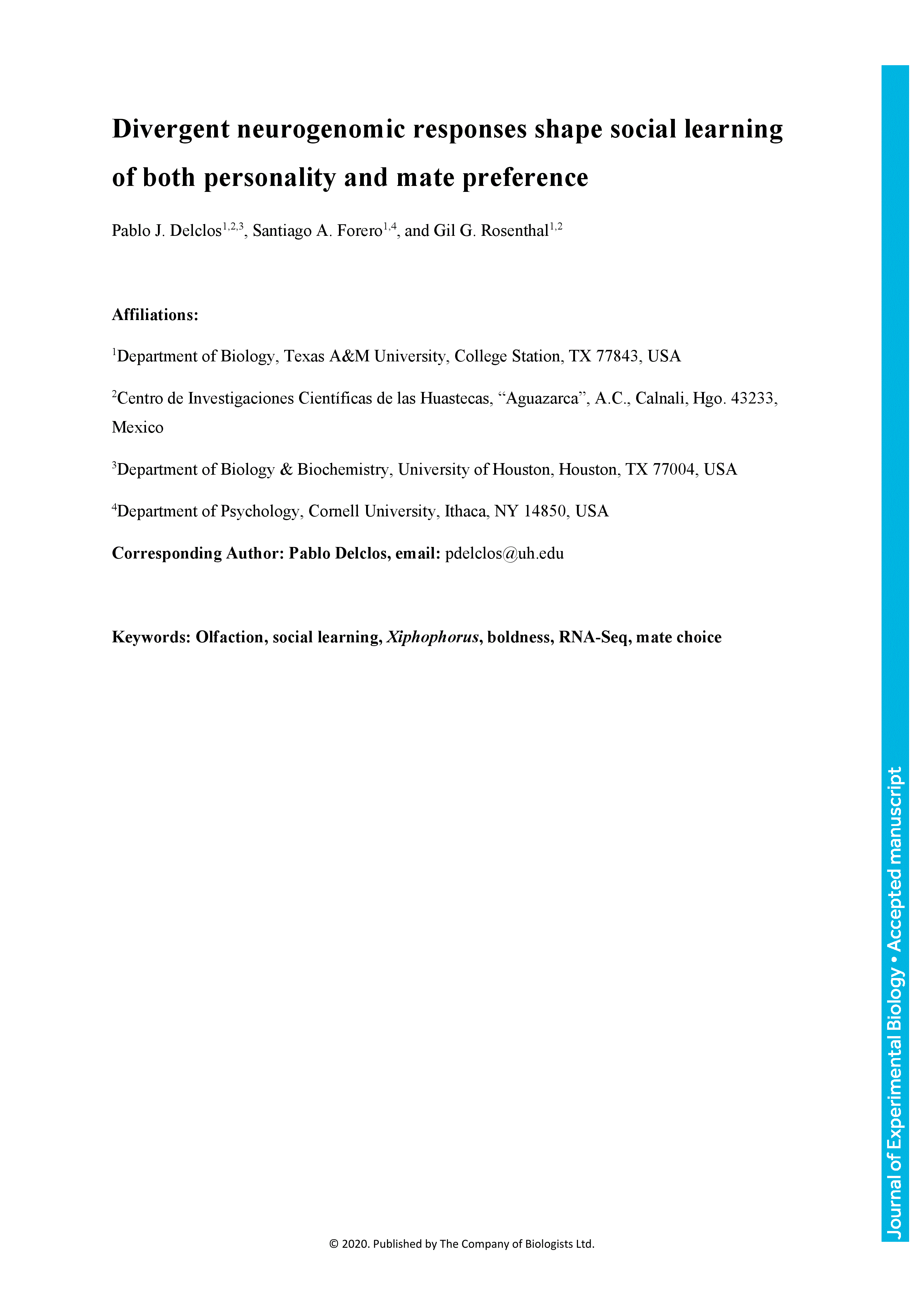Behavior plays a fundamental role in shaping the origin and fate of species. Mating decisions can act to promote or restrict gene flow, as can personality traits that influence dispersal and niche use. Mate choice and personality are often both learned and therefore influenced by an individual's social environment throughout development. Likewise, the molecular pathways that shape these behaviors may also be co-expressed. In this study on swordtail fish (Xiphophorus birchmanni), we show that female mating preferences for species-typical pheromone cues are entirely dependent on social experience with adult males. Experience with adults also shapes development along the shy-bold personality axis, with shy behaviors arising from exposure to risk-averse heterospecifics as a potential stress-coping strategy. In maturing females, conspecific exposure results in a strong upregulation of olfaction and vision genes compared to heterospecific exposure, as well as immune response genes previously linked to anxiety, learning and memory. Conversely, heterospecific exposure involves an increased expression of genes important for neurogenesis, synaptic plasticity and social decision-making. We identify subsets of genes within the social decision-making network and with known stress-coping roles that may be directly coupled to the olfactory processes females rely on for social communication. Based on these results, we conclude that the social environment affects the neurogenomic trajectory through which socially-sensitive behaviors are learned, resulting in adult phenotypes adapted for specific social groupings.
Divergent neurogenomic responses shape social learning of both personality and mate preference
Currently Viewing Accepted Manuscript - Newer Version Available
Pablo J. Delclos, Santiago A. Forero, Gil G. Rosenthal; Divergent neurogenomic responses shape social learning of both personality and mate preference. J Exp Biol 2020; jeb.220707. doi: https://doi.org/10.1242/jeb.220707
Download citation file:
Advertisement
2023 JEB Outstanding Paper Prize shortlist and winner

The JEB Editors are delighted to announce the shortlisted authors for the 2023 JEB Outstanding Paper Prize. Read the winning paper - Tiny spies: mosquito antennae are sensitive sensors for eavesdropping on frog calls - by Hoover Pantoja-Sanchez and Brian Leavell from Ximena Bernal's lab at Purdue University, USA.
JEB Science Communication Workshop for ECRs

If you’re an early-career researcher interested in science communication and are attending the SEB Annual Conference in Prague this summer, come a day early and join the JEB Editors at a sci comm workshop to learn the key writing skills needed to promote your research to a broad audience beyond your peers (1 July at 14.30-17.30). Places are limited to 24 attendees, and applicants should apply through the SEB registration page by 30 April 2024.
Bridging the gap between controlled conditions and natural habitats in understanding behaviour

Novel technologies enable behavioural experiments with non-model species, in naturalistic habitats and with underexplored behaviours. In their Commentary, Scholz and colleagues discuss how to obtain a deeper understanding of the natural ecology and lifestyle of study animals.
Beluga metabolic measures could help save species

To help save animals from extinction, it’s important to understand what each species needs to survive. This led Jason John et al. to measure the metabolic rates of captive belugas to develop a ‘fish calculator’ showing that the whales need to eat ~23 salmon per day.
ECR Workshop on Positive Peer Review

Are you an ECR looking for tips on how to write concise, astute and useful manuscript reviews? If so, join the JEB Editors at a 2-hour JEB-sponsored Workshop on Positive Peer Review at the Canadian Society of Zoologists annual meeting in Moncton on 9 May 2024 at 13.00-15.00. There are 25 spaces for ECRs and selection is first come, first serve. To sign up, check the ECR Workshop box when you register for the CSZ meeting.



